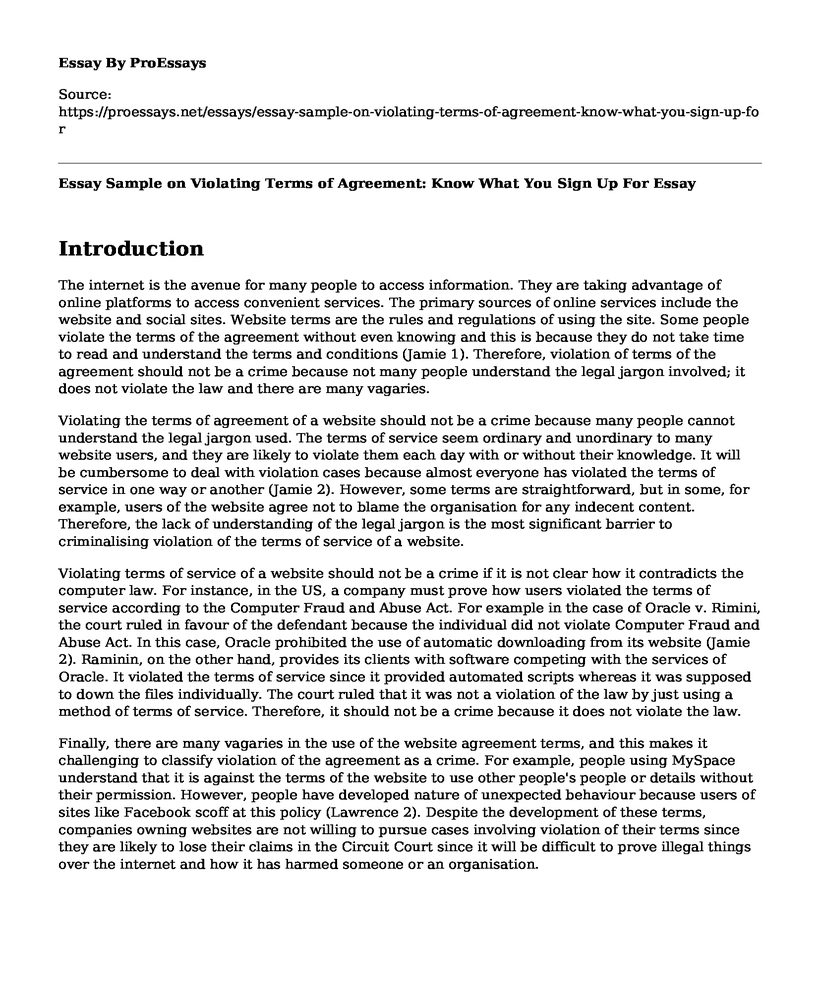Introduction
The internet is the avenue for many people to access information. They are taking advantage of online platforms to access convenient services. The primary sources of online services include the website and social sites. Website terms are the rules and regulations of using the site. Some people violate the terms of the agreement without even knowing and this is because they do not take time to read and understand the terms and conditions (Jamie 1). Therefore, violation of terms of the agreement should not be a crime because not many people understand the legal jargon involved; it does not violate the law and there are many vagaries.
Violating the terms of agreement of a website should not be a crime because many people cannot understand the legal jargon used. The terms of service seem ordinary and unordinary to many website users, and they are likely to violate them each day with or without their knowledge. It will be cumbersome to deal with violation cases because almost everyone has violated the terms of service in one way or another (Jamie 2). However, some terms are straightforward, but in some, for example, users of the website agree not to blame the organisation for any indecent content. Therefore, the lack of understanding of the legal jargon is the most significant barrier to criminalising violation of the terms of service of a website.
Violating terms of service of a website should not be a crime if it is not clear how it contradicts the computer law. For instance, in the US, a company must prove how users violated the terms of service according to the Computer Fraud and Abuse Act. For example in the case of Oracle v. Rimini, the court ruled in favour of the defendant because the individual did not violate Computer Fraud and Abuse Act. In this case, Oracle prohibited the use of automatic downloading from its website (Jamie 2). Raminin, on the other hand, provides its clients with software competing with the services of Oracle. It violated the terms of service since it provided automated scripts whereas it was supposed to down the files individually. The court ruled that it was not a violation of the law by just using a method of terms of service. Therefore, it should not be a crime because it does not violate the law.
Finally, there are many vagaries in the use of the website agreement terms, and this makes it challenging to classify violation of the agreement as a crime. For example, people using MySpace understand that it is against the terms of the website to use other people's people or details without their permission. However, people have developed nature of unexpected behaviour because users of sites like Facebook scoff at this policy (Lawrence 2). Despite the development of these terms, companies owning websites are not willing to pursue cases involving violation of their terms since they are likely to lose their claims in the Circuit Court since it will be difficult to prove illegal things over the internet and how it has harmed someone or an organisation.
Conclusion
Violating terms of agreement should not be a crime because website users cannot read and understand the legal jargon involved hence almost commits an offense. Also, the violation does not indicate how it violates the computer law making it difficult to prove in the court of law. Furthermore, many vagaries are making it challenging to pursue violators of the website, and it will take more than just violation to prove the harm it has caused. Therefore, it should not be a crime because some terms are not lawful and limit human rights.
Works Cited
Jamie, Williams. Ninth Circuit Doubles Down: Violating a Website's Terms of Service Is Not a Crime. Electronic Frontier Foundation, Jan 10, 2018. https://www.eff.org/deeplinks/2018/01/ninth-circuit-doubles-down-violating-websites-terms-service-not-crime. Accessed 18th April 2019.
Lawrence, Lessig. 2013. Aaron's Law: Violating a Site's Terms of Service Should Not Land You in Jail. Jan 16, 2013, https://www.theatlantic.com/technology/archive/2013/01/aarons-law-violating-a-sites-terms-of-service-should-not-land-you-in-jail/267247/. Accessed 18th April 2019.
Cite this page
Essay Sample on Violating Terms of Agreement: Know What You Sign Up For. (2023, Jan 05). Retrieved from https://proessays.net/essays/essay-sample-on-violating-terms-of-agreement-know-what-you-sign-up-for
If you are the original author of this essay and no longer wish to have it published on the ProEssays website, please click below to request its removal:
- Computer System and Network Security Paper Example
- Best Practices of Digital Portfolio
- Relationships of Feedback Loops and Information Systems Essay
- Bloomberg Terminal Paper Example
- Essay Sample on the Impact of the Internet in Society
- Personal Statement: Msc Remote Sensing and GIS
- Paper Example on Ready Player One: Parzival's Isolation Journey







